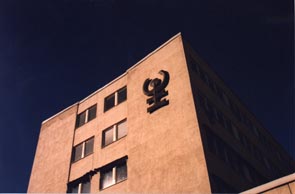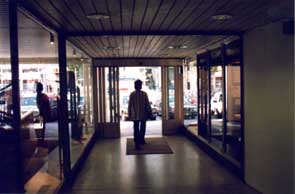HCentrum
HCentrum

H-Centrum is an anomaly, a remnant from earlier days which has managed
to staunchly defend its position in downtown Uppsala despite aggressive
efforts from competitors all around. It is bathed in signs which suggest
a mythological dimension, faded memories of better days. The big logo
which towers above the shops and appears on all the shop signs suggests
on the one hand something runic, Viking-like, and on the other hand a
human being with outstretched arms, ready to embrace the other members
of the collective in a happy show of togetherness.
The Centre was not created by a collection of ambitious entrepreneurs
who excelled at their respective crafts; it was put there by communal
planning, and it was decided which services the town would need. Thus,
there are the tobacco shops, hairdresser's, and flower shops, with few
clients but, apparently, eternal staying power.

Walking through the mazes of H-Centrum, everything is calm and silent
except for the occasional sensation of hearing muffled whispers from bygone
days. One can still enjoy that old communal smell which has become so
rare nowadays. The layout is strictly linear, and all shops have a standardized
look and sign. Sometimes it feels like walking through a ghost town, except
the shopkeepers are still there. It's just difficult to understand who
would want to buy anything in these ill-lit caverns of communalized desire.

These collectivistic touches are partly influenced by Communism, fashionable
at the time, but on a deeper level echo the well known fact that Swedes
are not individual human beings, but exist only through membership in
parties, guilds, or associations. This does not mean that they do not
have a high degree of collective intelligence, like ants in a hive. Following
in the tradition of the great civilizations of China and Japan, Swedes
detest individuality, eccentricity, and self-confidence. They have a highly
developed system of jealousy, which is directed towards those mutant specimens
who stray too far from the crowd. "The nail that sticks out must
be hammered down." Ronald Huntford, in his 1971 book "The New
Totalitarians", attributes this to the absence of the Renaissance
from Sweden.

But the centre, like the old "people's home" Sweden, is under
attack from foreign and potentially dangerous sources. The newest shop
is an African Falafel joint, Ambessa, which stretches the limits of Swedish
opening hours, not closing before 03 on most weekdays. Speculations of
cannabis dealing and other shady business are never far away. The parking
lot, in the daytime a peaceful base for leisurely shopping exhibitions,
at night turns into a homestead of black market taxis.
On the other side of the street, aggressive American capitalism has manifested
itself in the form of a McDonald's restaurant, which rapidly became the
no 1 place for drunken post-club hanging-out in the weekends. On Saturday,
the place becomes packed to the limit, to the point where the staff can't
see the street outside. Brawls are common, and it is rumored that a man
was killed there two years ago; the authorities quickly put a lid on it.
Despite this, the H-Centrum still ekes out its miserable existence, a
symbol of Sweden itself, struggling with the contradictions and possibilities
of modern times. It remains to be seen whether it will be squashed like
a fly due to outside pressure, or whether it will live on forever ...
and ever ... a funhouse mirror image of the beautiful dream in the Swedes'
hearts.
-Mikael
Huss
|



